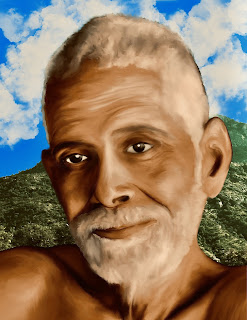“|3| He, who seeks from where the ‘I’ arises, with pure mind, turned inwards, realising his own nature, O Arunachala, merges in you... like the river in the sea.” (Excerpt From Arunachala Pancharatna by Ramana Maharshi) “Atma-vichara is the means and the goal. The ‘I’ that rises and sets is not the real ‘I’. It is nothing more than the meandering cloud, which moves, changes, and finally empties when at last it approaches the mountain. When the mind becomes pure, it, naturally, rushes to its source, like a mountain stream rushing towards the sea, effortlessly overcoming all obstacles in its path. Atma-vichara is the purifying process which rids the mind of all impurities (mindstuff). Take up the quest ‘Who am I?’ Seek the impostor (ego-'I'). In the end, he is nowhere to be found!” (Excerpt from the commentary to Ramana Maharshi’s above verse , by MNW. This material may be protected by copyright.)

